RW’ers are often thrust into an uncomfortable position whenever they open one of the great science fiction classics. So many of the landmark works and authors are unabashed progressives so much so that you could probably trace the history of the revolution through period Sci-Fi pieces. I think it’s unfair to characterize Sci-Fi as an inherently Leftist genre, but it is undeniable that the great pens of Science Fiction largely wrote left. Whenever a RW’er cracks open a book from Asimov or Clarke or even Wells, he is stepping into enemy territory. And so he is left with a painful dilemma.
Should he continue reading even though he is perusing the manifestos of the men he stands against? Or should he close the book, take a stand, and throw these masterworks of literature onto the bonfire?
Now this essay isn’t moral advice or instruction. If you’re morally struggling with a text you wish to read, take it up with your priest or spiritual leader. And if they say no, let that be no. Personally, I can think of a few texts which deserve to be burned, and it is by no means a bad thing to protect your imagination—its actually a virtue. This essay presumes you are proceeding prudently and in good conscience but wish to reconcile the prose with the art, the material with the numinous, and the atheist with God.
Where do you find Rightwing lessons in Leftwing literature?
For this, we have to return to an old truth long subverted into Leftist rhetoric. And that truth is: art is bigger than the artist. Anyone who has written a book can remark upon readers taking away messages they didn’t intend—interpretations on characters or plotlines that are widely different than what the author envisioned. Passages of little importance may become enthralling and game changing, or huge plot twists may become predictable and mundane. When the reader enters, a whole new world is breathed into the text, renewed into a unique creature that may be entirely different from the one that came before.
The Left calls this “Death of the Author” and this process of reincarnation the death of objectivity. They use these tools for two purposes. The first is to deconstruct anything that opposes them. Lord of the Rings becomes a homoerotic romance between Frodo and Sam, for example. The second is to uplift and exaggerate the virtues of their own art. The toilet seat becomes an act of stunning and brave rebellion against artistic norms.
You’ll notice they will only employ this tactic to their own advantage. The Conservative is never allowed to have his own interpretation that contradicts the Left’s narratives. Starship Troopers is a satire of fascism and how dare you think otherwise. Death of the Author? Never heard of ‘em.
This tactic allows the Left to attack and defend, a bait and switch they will never apply consistently. Anything beautiful is to be deconstructed. Anything ugly is to be praised. And whenever the enemy tries to use these tools, deride them for not being media literate. That, or call them fascist.
And because definitions and objectivity are difficult to be pinned down in art, RW’ers often stumble in these arguments. They submit to this trick, and ergo, the toilet seat. They don’t realize that just because you can’t put it down on paper that it doesn’t mean it doesn’t exist. Just because something is ineffable doesn’t make it not real.
Writing (and art) isn’t a slab of stone where you write down “the message” and there it stands motionless for all time. It is organic. It is alive and breathing alongside the audience. When a person sets a book down, it gasps and dies, and when he picks it back up, it springs back to life. It is playful and angry and anguished and loving. It is horrible and wonderful and sublime. Writing is a creature that sleeps in the day and prowls in the night. And if it’s any good, it will catch you completely unawares.
So of course there are no strict definitions or interpretations! There’s nowhere in a Dostoevsky novel where I can point to and say, “Here! Here was the message!” The entire body of text is the message. Every choice in texture, every flourish of prose, every odd pause in a character’s dialogue is the message. And if it were otherwise, then Dostoevsky need not have written at all.
If you can successfully reduce a work to a sentence, you have abolished it. And the artist was never really that good to begin with.
The Left sees this as the death of meaning, but it is rather that meaning is asking to be chased. And while I may never catch it or truly understand it, I can still see it for what it is. I can look at the movie Starship Troopers, and I can see the director’s intention clashing with what the narrative is telling me. And that narrative is screaming at me that humans are good and the bugs are bad.
Objectivity exists in writing and art. It may only be fully comprehended by God, but it exists. And through only the admission that we are capable (by God’s grace) of understanding truth, we regain everything the Left have snatched away with their nihilistic poison. We can once again separate lower art from higher. We can evaluate which interpretations are true or truer. We can outright dismiss some as false. And we can finally resume our pursuit of the numinous and the ineffable through the art we make.
Taking this back around to examining Sci-Fi stories, I find the most useful tool in understanding Leftwing art is looking at the gaps and distortions of the narrative that arise when they try to paper over inconvenient truths. You can separate the artist from God, but you can never separate God from the artist. It is in questioning the key assumptions of the text that you find reactionary themes.
How many Sci-Fi stories turn from uplifting to horrific if you believe transhumanism is bad? The ending of 2001: A Space Odyssey becomes much darker when you realize the aliens are almost certainly not benevolent. What happens if you take a close look at Star Trek’s utopia and the technologies underpinning it? Doesn’t every time someone uses a transporter they technically die? What if you think about the real world consequences of post-scarcity?
I’m going to give a longer example. Both my Twitter and my Substack account are direct references to Isaac Asimov’s Foundation series. I think it’s time I finally discussed my thoughts on this work and my interpretation of it. Asimov is a thoroughly atheistic, progressive author, and his Sci-Fi epic reflects these views. So, where are the reactionary themes hidden within this landmark series?
I’ll be considering the five main books from the first Foundation novel to Foundation and Earth.
To begin, Foundation is set in a galactic imperium which is the space version of the Roman Empire. Psychologist Hari Seldon has invented a new science which predicts the rise and fall of civilizations. Armed with this knowledge, he comes to the realization that the galactic empire shall soon collapse and send all of human society into a new dark age.
He comes up with a plan to establish two Foundations (get it?) on opposite sides of the galaxy. There, they will be beacons of science of reason that will shorten the dark age to a mere one thousand years and re-establish a new galactic empire. The first book mainly covers the mechanics of psychohistory and then puts it to example over several centuries. Foundation (the 1st one) goes through several crises that are resolved through heroic characters and realigning social incentives. In the first book, Foundation goes from an outpost to a nation-state to a religious and then mercantile empire. The book ends with Hari Seldon’s plan proceeding perfectly and everything appearing on track.
In Foundation and Empire, the Foundation has finally grown large enough to be a threat to the remnants of the collapsing empire. General Bel Riose sets out to defeat this new rival, but through the machinations and predictions of psychohistory, loses. A century later, the empire finally falls into civil war and collapses. Foundation stands triumphant with no remaining enemies who can contend with them.
However, a telepathic mutant is born. This unlikeliest of unlikely scenarios fell outside of Hari Seldon’s predictions. Calling himself “The Mule” this mind-controlling mutant sets out on a galactic conquest which comes to the door of Trantor (the old capital of the empire) itself. It is only through the intervention of the secretive Second Foundation that he is subverted, and then properly defeated in the sequel. The third book concludes with the fallout and the plan being placed back on track.
The first three books, if we are to boil them down to their essential elements, are about the salvation of civilization through the intellectual—managerial—class. Isaac Asimov conceptualizes the problems of history as boiling down to a lack of expertise in the room. It’s a typical atheistic viewpoint. If only we can get enlightened, reasoning technocrats in charge, then the problems of governance and the human condition will eventually solve themselves. Nothing, not even the extraordinarily complicated event of civilizational collapse, is beyond scientific understanding. And once understood, to be engineered for a better world.
But is Isaac Asimov’s conception really a better world? He sees the galactic empire as a fundamentally good thing, a vast bureaucratic entity that exists to regulate society everywhere and on every level. Imagine desiring to pause America as it was during the Covid Lockdowns, when we got a really good look at what “rule by experts” means.
Read from a reactionary spirit, Isaac Asimov’s epic of science triumphing over human nature becomes a tragedy of a galactic scale. Science has effectively abolished mankind, whose teeming masses are now just numbers on a computer model. It doesn’t matter what you say or what you do or what you believe. The future was writ in stone by the dictates of Hari Seldon, a dead man born hundreds of years ago.
C.S. Lewis’ Abolition of Man takes on new meaning when applied on this stage. The men rebelling against psychohistory are not evil; they are the last gasps of a humanity struggling to escape free. General Bel Riose is by all rights a great man of history, but he is denied his moment to make his mark. Through no fault of his own, he has been chained to an unavoidable future that ends with his tragedy.
The Mule as a character is even more interesting. God might as well have descended from the sky and handed him the mandate of heaven. He is a man who solely possesses the means for humanity to break free of itself, not just a Caesar, but a savior. Mankind’s final hopes of choosing his own destiny rested squarely on his shoulders.
The Mule is not a villain, but a tragic hero. It is only in his story that history—and not a mathematician’s graph—begins to move again.
But in the end, he lost. Technocracy and oligarchy prevailed. The galaxy’s last hope of an actual man in charge and not a graphing calculator died with him. Second Foundation, the last book in the trilogy, ends with a gray pall darkening on the horizon. This new empire will be eternal. Another man like The Mule may come again, but maybe not. And if he does, there will be legions against him.
The great tragedy ends with the last link of the galactic chain forged. Man has shackled himself, and there may never come another to free him.
And if you think that’s just my interpretation—that it has no bearing on the real work, think again. Because Asimov realized this exact same problem too, and he wrote two more books to try to correct it.
Foundation’s Edge and Foundation and Earth are a far more personal story. Instead of covering centuries, they cover a single lifetime and the adventures of one individual. It follows the narrative of Golan Trevize, a man who uncovers a conspiracy that leads him not only to the discovery of Second Foundation’s plans, but also the machinations of Gaia, a group-consciousness encompassing a planet.
To keep things simple, Gaia wishes to envelop the whole galaxy into an interconnected group consciousness to create a paradise alternative to the plan set forward by Second Foundation. Foundation’s Edge ends with Trevize siding with Gaia. Foundation and Earth follows his doubts, search for Earth, and eventual reaffirmation of this new plan.
These two books darken the tragedy I have outlined thus far. Humanity, finding the cold logic of psychohistory unbearable, turns to transhumanism. If you’ve noticed what I’ve described as Gaia resembling an organic version of The Borg from Star Trek, then yes, it is very much like that. Except Asimov portrays this subsuming of the galaxy as a good thing and in the best possible light.
But anyone who knows better can see what has really happened. The scientist, after abolishing the man, decides to do away with humanity altogether. The galaxy is turned over to something other. The millennia long story ends with humanity’s destruction, and the birth of something entirely alien. The Foundation story is really about the last gasps and finally death of humanity. It is a tragedy of staggering scale relaying a cold, hard truth.
In the long run, we lost.
Once you learn to look, it is funny how many progressive stories are reactionary tragedies. I don’t see this lens as ruining great works for me—in fact, they deepen my appreciation. I threw Foundation and Earth away when I finished it because I was disgusted by it (and not just by the Galaxia ending. If you have ever read the book, yes, I am talking about that).
Whenever a progressive tries to lie about their ideology in their story, reality will always poke holes in their narrative. Truth finds a way. And even when progressives try to present the most biased, cherry-picked perspective possible, there is always the shadow of the inconvenient truths waiting underneath. You can viscerally feel the absence of God in a story just as much as you would feel His presence.
And in learning to uncover these hidden truths, we can find new depth in spite of what the artist was trying to say. The art turns around and condemns the artist for their falsehoods. In this manner, no matter how hard progressives try, they can never escape the Rightwing. We have reality on our side, and while it can be denied, or misrepresented, or outright ignored, it can never be erased. It will assert itself on its own terms, and the Left can never subvert that.





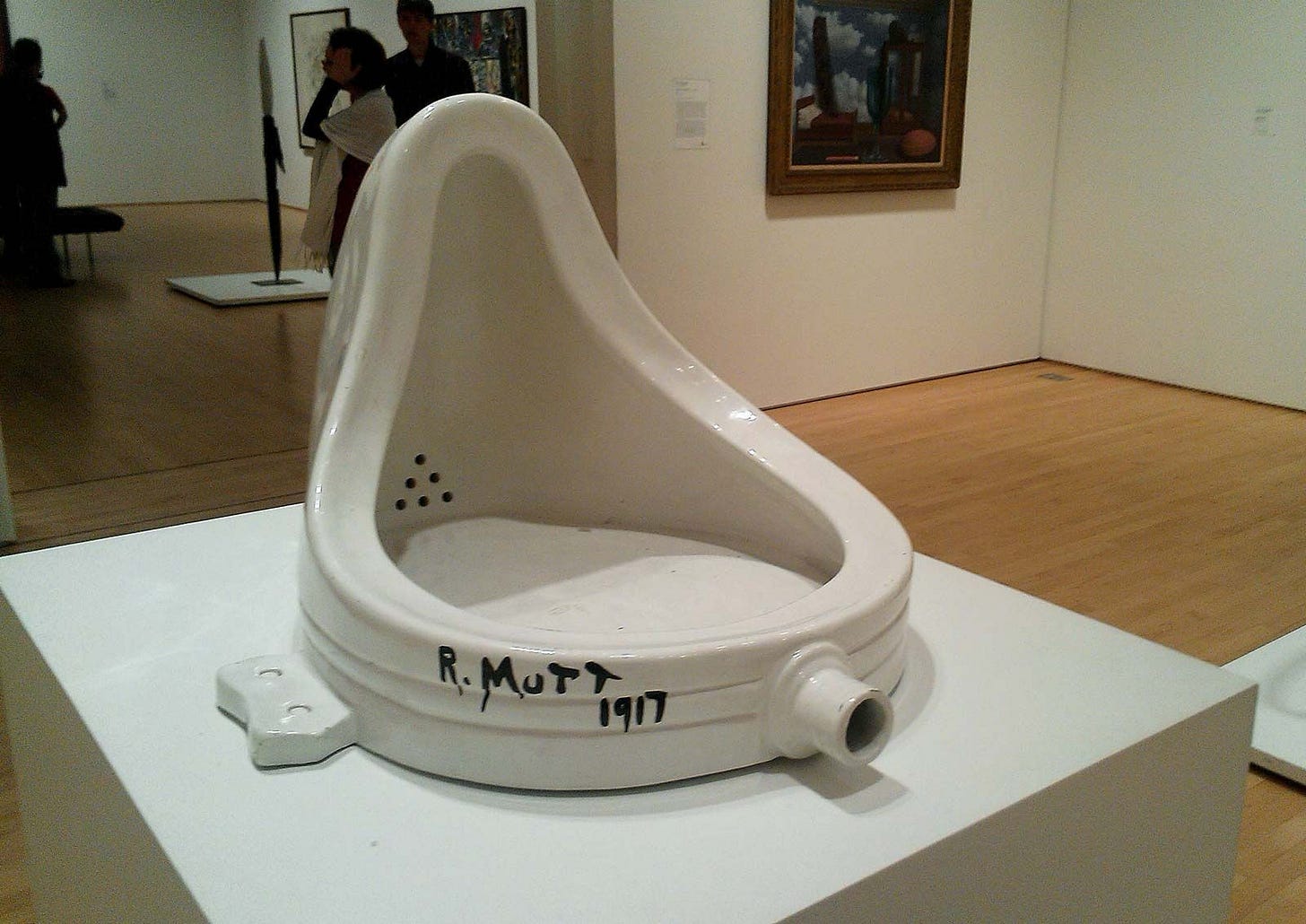
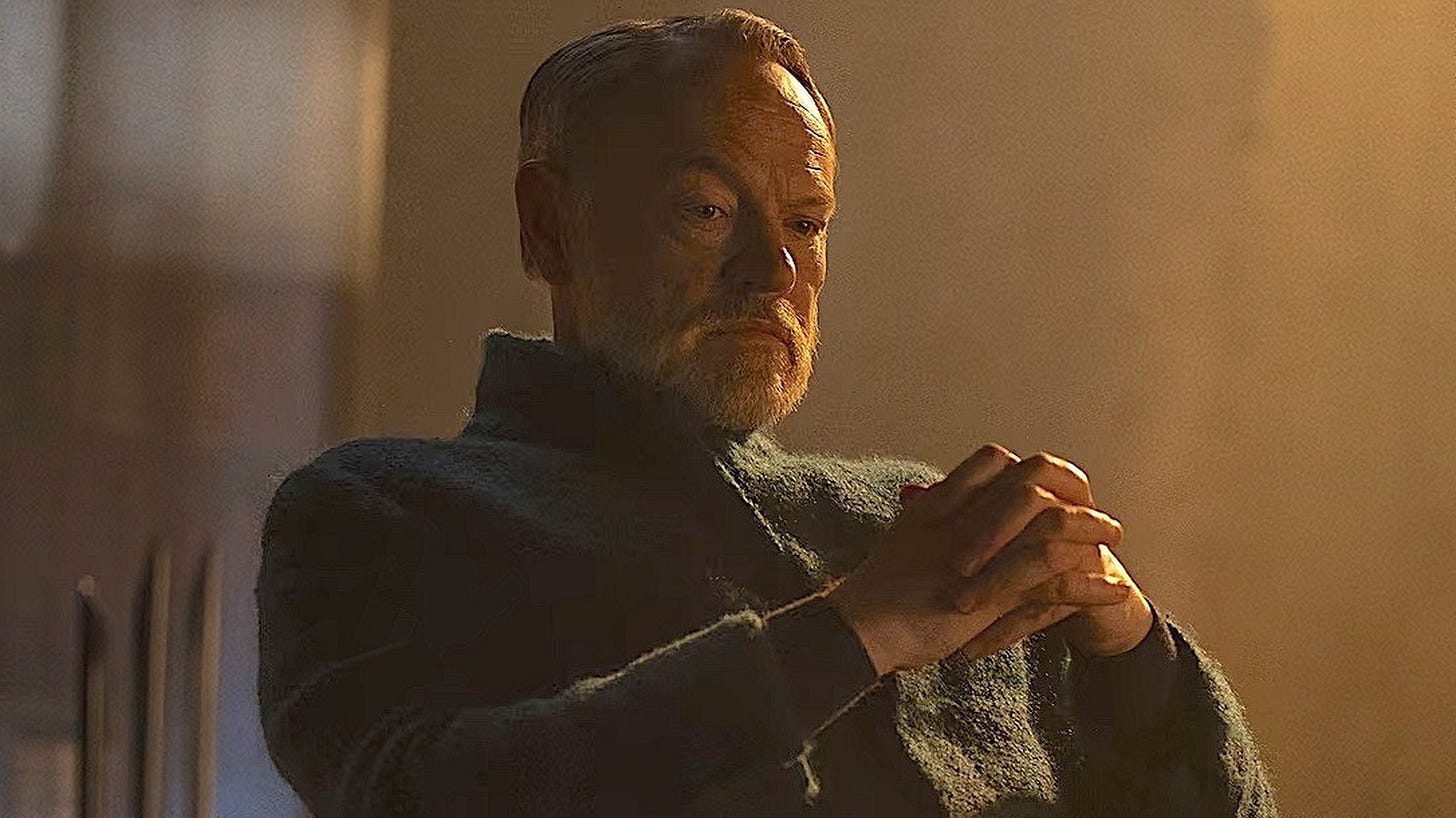
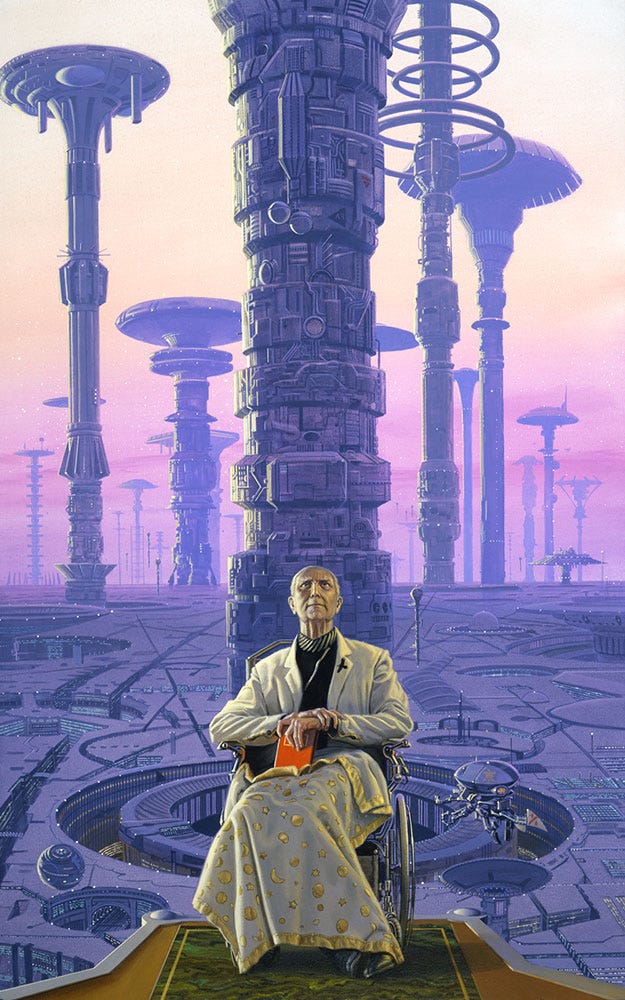
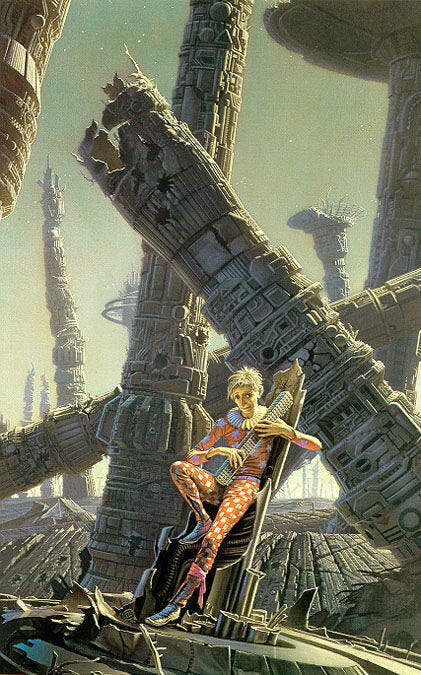
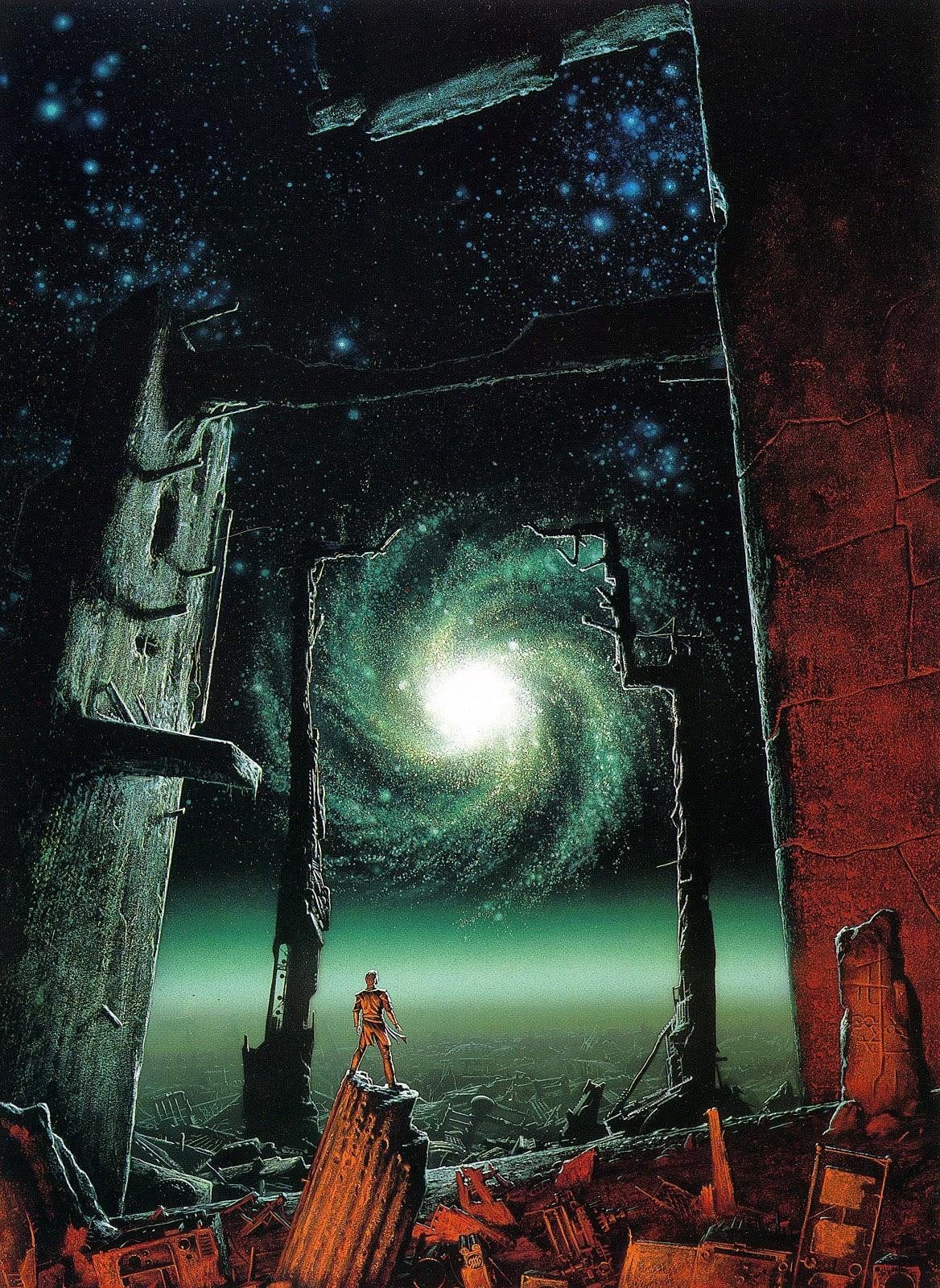
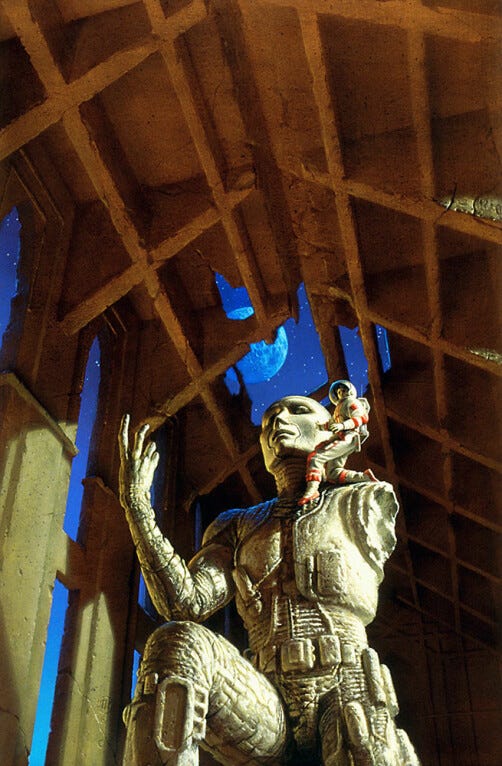
The Mule should have won
As you can tell by my username, I too was heavily influenced by Isaac Asimov's Foundation trilogy. But my reading of it was different than yours - in part because I choose to ignore the existence of any books past the first trilogy - and when the adaptation was announced, I stopped to really think about how it could be portrayed on screen. Obviously, you can't portray the trilogy as-is on television; you have to change or add *something*, because large sections of it are just people talking in blank rooms. But I think it could be done.
And the message I got from the book was that civilization rests on a thin sheet of glass, so fragile it could be broken with a touch, and without men of absolute devotion willing to sacrifice not just their deaths but their lives so that their great-grandchildren can live, civilization will fall and the lamps will all go out.
Picture this: in the first few chapters of the books, Seldon teaches Gaal Dornick the axioms of psychohistory in one afternoon, in a conversation held in a single room. In a TV show, these axioms could take up half the season. They meet on Trantor, as before, but Gaal Dornick is as eager for immediate action as she is smart, wanting to use her math skills ('her', since in this hypothetical we're under AppleTV's casting constraints) to enact immediate change, to start doing things *now* to help people. She insists "People are suffering in incomprehensible numbers, and we have to help them!" For Hari's response, we bring in a line from the book:
"You say that without thinking. What of psychohistory?"
"I hadn't thought of applying it to the problem."
"Before you are done with me, young lady, you will learn to apply pyschohistory to *all* problems as a matter of course."
And so we kick off perhaps episode 2 travelling a few thousand lightyears away for a case study in psychohistory. Here's a town in a region on a planet in that's getting screwed over by a nearby city. Here, carved quickly into the ice or the sand or the stump of a super-redwood tree, are the parameters for the incentive structure governing the relationship between town and city. You want to correct injustice? Start there.
Oh? After an episode of solid effort, you've succeeded? The nice city council members responded to your clever negotiation tactics and game-theoretic explanations of the benefits of cooperation rather than exploitation? Excellent! Pity you didn't factor in the provincial government, though. See, they've been under pressure from the planetary governor to clamp down, after that minor rebellion on the other side of the planet five years ago that never made galactic news and that you've never heard of. Any city that starts to get too friendly with its suburbs starts to make the provincial lords awful nervous about a repeat, and they're extremely suspicious when you bring in words like "Nash equilibrium", so they'll be appointing their own, more cooperative city council members, thanks.
You seriously thought you could get in touch with the planetary governor? Why would he care? He only knows Meyerhoff City as a place on the map and a minor source of uranium (though it's been running a bit slow lately; hard to get good mining engineers these days), and he's never even *heard* of the little town of Gellhorn. This is a tiny planet, yes. Only a billion and a half people on it. Scarcely inhabited, compared to a galaxy. But that's still a mighty big number. If a percent of a percent of a percent of its citizens want to talk to the governor for five minutes, you have a thousand people in line ahead of you. Care to wait? Think it'll help?
Third Axiom of Psychohistory: Human conglomerates possess resistance to deviations from historical trajectories. The greater the deviation, the greater the required force and time.
Thus endeth the lesson.
As the season progresses, we see Gaal start to apply psychohistory more and more to each new planet she and Hari Seldon travel to, until finally they're both arrested and brought back to Trantor for the trial. Naturally, from force of habit, she applies the same math to Trantor itself, thus getting the inevitable reveal that the Galactic Empire is dying.
The book doesn't explicitly explain why Hari had to recruit Gaal from halfway across the galaxy, given that there are billions or trillions (Asimov's inconsistent) of people on Trantor, but I will. There are people too numerous to count consistently, but so few of them are first-rate mathematicians, and so few of the first-rate mathematicians are people who *care* about what will happen beyond their lifetime or at most their children's, that a gigantic net nevertheless catches very few fish.
And why go to all the trouble of taking her across the galaxy? For the same underlying reason that shartening the dark age is so difficult: inertia. They could sit in a room all day, and Gaal could learn the math of it all, but unless you go out there and actually try drawing it out in the sand with real people and real consequences, it doesn't stick. You need a LOT of force to effect a large change, and thus you *have* to take the time with every new recruit, because no level of dedication short of "absolute devotion" is going to be enough.
I know that's not what Asimov *wrote*. But reading the books as a teenager, that's approximately what I read.